非常详细的虚拟语气讲解资料
- 格式:doc
- 大小:167.00 KB
- 文档页数:43



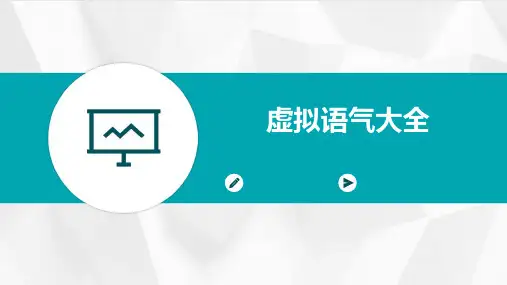

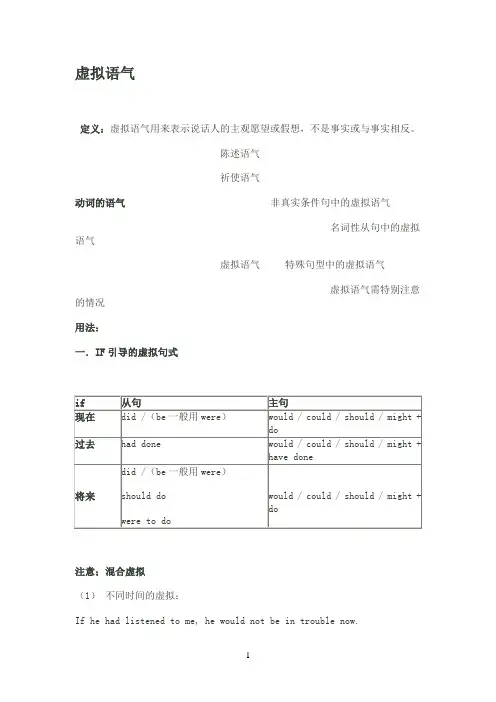
虚拟语气定义:虚拟语气用来表示说话人的主观愿望或假想,不是事实或与事实相反。
陈述语气祈使语气动词的语气非真实条件句中的虚拟语气名词性从句中的虚拟语气虚拟语气特殊句型中的虚拟语气虚拟语气需特别注意的情况用法:一.IF引导的虚拟句式注意;混合虚拟(1)不同时间的虚拟:If he had listened to me, he would not be in trouble now.If he had told me yesterday, I should know what to do now.(2) 虚拟与陈述的混合:He could have passed the exam, but he wasn’t careful enough. You should have come earlier, the bus left a moment ago.二.名词性从句中的虚拟语气:从句谓语动词(should) +do1.主语从句:it is + adj + that结构2.宾语从句:主语+要求接虚拟语气的动词+that一个坚持:insist两个命令:order; command 两个决定:decide; determine三个建议:suggest; advise; propose四个要求:demand; ask; request; require注意:① suggest:暗示;insist:坚持说(不虚拟)② except, believe, think suspect等动词的否定形式或疑问句后面的宾语从句要用虚拟。
I never thought that he should be such a brave young solider③ should竟然I am glad that your novel should have won the first prize.④ wish引导从句的虚拟语气,谓语动词变化和if从句虚拟语气一样。
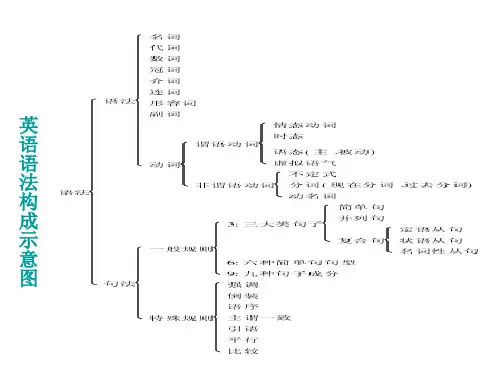
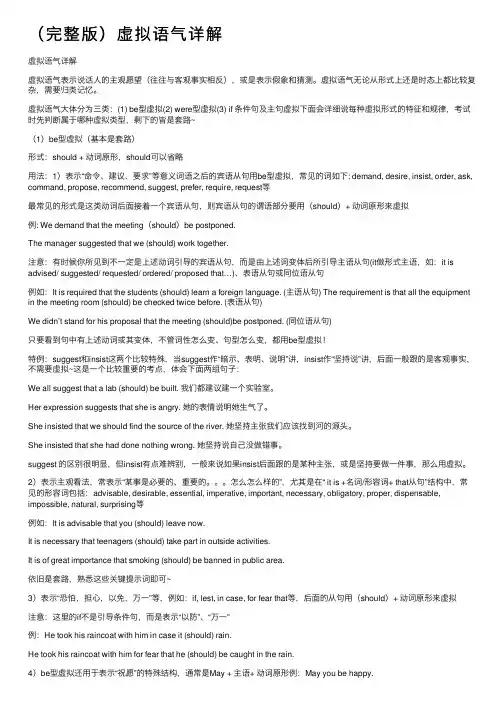
(完整版)虚拟语⽓详解虚拟语⽓详解虚拟语⽓表⽰说话⼈的主观愿望(往往与客观事实相反),或是表⽰假象和猜测。
虚拟语⽓⽆论从形式上还是时态上都⽐较复杂,需要归类记忆。
虚拟语⽓⼤体分为三类:(1) be型虚拟(2) were型虚拟(3) if 条件句及主句虚拟下⾯会详细说每种虚拟形式的特征和规律,考试时先判断属于哪种虚拟类型,剩下的皆是套路~(1)be型虚拟(基本是套路)形式:should + 动词原形,should可以省略⽤法:1)表⽰“命令、建议、要求”等意义词语之后的宾语从句⽤be型虚拟,常见的词如下: demand, desire, insist, order, ask, command, propose, recommend, suggest, prefer, require, request等最常见的形式是这类动词后⾯接着⼀个宾语从句,则宾语从句的谓语部分要⽤(should)+ 动词原形来虚拟例: We demand that the meeting(should)be postponed.The manager suggested that we (should) work together.注意:有时候你所见到不⼀定是上述动词引导的宾语从句,⽽是由上述词变体后所引导主语从句(it做形式主语,如:it is advised/ suggested/ requested/ ordered/ proposed that…)、表语从句或同位语从句例如:It is required that the students (should) learn a foreign language. (主语从句) The requirement is that all the equipment in the meeting room (should) be checked twice before. (表语从句)We didn’t stand for his proposal that the meeting (should)be postponed. (同位语从句)只要看到句中有上述动词或其变体,不管词性怎么变、句型怎么变,都⽤be型虚拟!特例:suggest和insist这两个⽐较特殊,当suggest作“暗⽰、表明、说明”讲,insist作“坚持说”讲,后⾯⼀般跟的是客观事实,不需要虚拟~这是⼀个⽐较重要的考点,体会下⾯两组句⼦:We all suggest that a lab (should) be built. 我们都建议建⼀个实验室。
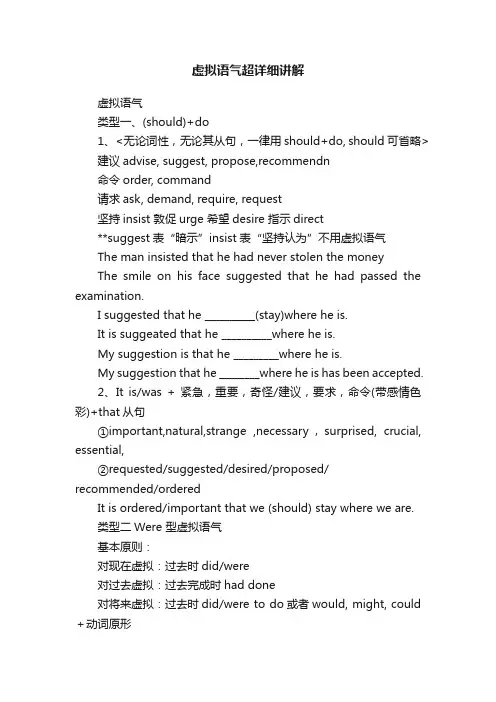
虚拟语气超详细讲解虚拟语气类型一、(should)+do1、<无论词性,无论其从句,一律用should+do, should可省略>建议advise, suggest, propose,recommendn命令order, command请求ask, demand, require, request坚持insist 敦促urge 希望desire 指示direct**suggest表“暗示”insist表“坚持认为”不用虚拟语气The man insisted that he had never stolen the moneyThe smile on his face suggested that he had passed the examination.I suggested that he __________(stay)where he is.It is suggeated that he __________where he is.My suggestion is that he _________where he is.My suggestion that he ________where he is has been accepted.2、It is/was + 紧急,重要,奇怪/建议,要求,命令(带感情色彩)+that从句①important,natural,strange ,necessary,surprised, crucial, essential,②requested/suggested/desired/pro posed/ recommended/orderedIt is ordered/important that we (should) stay where we are.类型二Were 型虚拟语气基本原则:对现在虚拟:过去时did/were对过去虚拟:过去完成时had done对将来虚拟:过去时did/were to do或者would, might, could +动词原形1. if 条件句中的虚拟时间从句谓语形式主句谓语形式将来动词过去式(be用were)should + 动词原形were to + 动词原形would / should / might / could + 动词原形现在动词过去式(be 用were) would / should / might / could + 动词原形过去had +动词过去分词would / should / might / could have + 动词过去分词1.1 与现在事实不一致,其句型为:If +主语+did ,主语+should (could, would, 或might )+do .If I were you, I would study hard. (可倒装)If it rained, I would not be here now.1.2 与过去事实不一致,句型为:If +主语+had +done ,主语+should (could, would, 或might )+have +done. If the doctor had come last night, the boy would have been saved. (可倒装)1.3 将来事实不一致,句型为:If should were to 主语++do ,主语+should (could ,would, 或might )+do. If it should rain tomorrow, we would stay at home.(可倒装)If I were to go to the moon one day, I could see it with my own eyes.(可倒装) If you missed the film to night, you would feel sorry.(混合虚拟)难点:①在条件句中如果出现were, had, should 可省去if ,将主语与这些词倒装 Had the doctor come last night , the boy would havesaved.Were I to go to the moon one day , I would see it with my own eyes.Should it rain tomorrow , we would stay at home.②当条件状语从句表示的行为和主句表示的行为所发生的时间不一致时,被称为“错综时间条件句”,常常表现为if+过去虚拟+主句现在虚拟If you had followed my advice, you would be better now.If you had studied hard before, you would be a college student now.2. wish 后面的宾语从句中与现在愿望不一致: 主语+did ; I wish I were you.与过去愿望不一致: 主语+had +done ;I wish I had visited the white House when I was in the states.与未来愿望不一致: 主语+would (could )+do 。
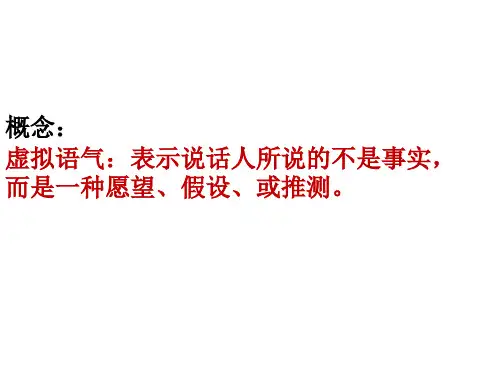
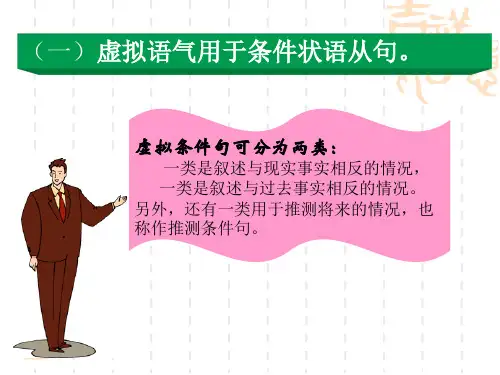
虚拟语气的种类及用法详解虚拟语气是英语中一种特殊的语法现象,用来表达与事实相反、与现实相悖或假设情况下的语气。
虚拟语气分为几种不同的形式,每种形式都有其特定的用法和意义。
本文将详细介绍虚拟语气的种类以及相应的用法。
一、虚拟语气的种类1. 条件虚拟语气(the conditional subjunctive)条件虚拟语气用来表达假设情况下的语气,指不太可能或不可能发生的情况。
具体形式上,条件虚拟语气由"if"引导的句子中使用"were"代替"was",虚拟语气的主要动词常为动词不定式。
例句:If I were a bird, I would fly to the highest mountain.(如果我是只鸟,我就飞到最高的山上。
)2. 建议虚拟语气(the subjunctive of suggestion)建议虚拟语气用于表达对他人的建议、命令或要求。
通常以动词原形出现。
需要注意的是,在现代英语中,建议虚拟语气的使用已经相对较少。
例句:I suggest that he eat more fruits and vegetables.(我建议他多吃水果和蔬菜。
)3. 祝愿虚拟语气(the subjunctive of wish)祝愿虚拟语气用来表达对与现实相反的愿望或希望。
主要由"as if"或"as though"引导的从句中使用虚拟语气形式的动词。
例句:I wish I were taller.(但事实上我并不高。
)4. 值得虚拟语气(the subjunctive of value)值得虚拟语气用于表达对某事的怀疑、否认、批评等感觉或观点。
常以"should"引导的从句中使用虚拟语气形式的动词。
例句:It is strange that she should arrive so late.(她竟然这么晚才到,真是奇怪。
虚拟语气(精华)虚拟语气是一种特殊的语法现象,它表达的是一种假设、愿望、建议、请求等非现实的情况。
在英语中,虚拟语气常常用于表示与现实相反的情况,或者表示对未来的期望。
虚拟语气的使用可以使语言更加生动、丰富,更具有表现力。
虚拟语气的基本形式包括三种:现在虚拟、过去虚拟和将来虚拟。
现在虚拟表示与现实相反的情况,过去虚拟表示与过去事实相反的情况,将来虚拟表示对未来的期望或假设。
例如,现在虚拟可以用来表示一种不可能实现的情况,如:“IfI were a bird, I could fly.”(如果我是只鸟,我就能飞。
)这里的“如果我是只鸟”就是一个与现实相反的假设,因此需要使用虚拟语气。
将来虚拟则用来表示对未来的期望或假设,如:“If I pass the exam, I will go to college.”(如果我能通过考试,我就会上大学。
)这里的“如果我能通过考试”是一个对未来的期望,因此需要使用虚拟语气。
虚拟语气在英语中的使用非常广泛,掌握虚拟语气的用法对于提高英语水平,丰富语言表达具有重要作用。
通过学习虚拟语气,我们可以更好地理解和运用英语,使我们的语言更加生动、丰富,更具有表现力。
虚拟语气(精华)在英语的学习过程中,虚拟语气是一个较为复杂且重要的语法点。
它不仅用于表达非现实的情况,还常常用于表达委婉的建议、请求或命令。
虚拟语气通过特定的动词形式和助动词的使用,使得句子具有一种特殊的语气,从而传达出特定的情感或态度。
在商务英语中,虚拟语气常用于提出建议或请求,以避免过于直接或强硬的表达。
例如:“It is important that the report be submitted the end of the week.”(报告必须在周末前提交,这是很重要的。
)这里的“be submitted”是虚拟语气的形式,用来表达一种要求或建议。
在文学作品或日常对话中,虚拟语气也常用于表达愿望或遗憾。
高考英语语法复习虚拟语气知识讲解一、基础知识(一)什么是虚拟语气谓语动词的作用不仅可以表示动作的时间、状态、假设(情感),也是一种语气(mood)的表现形式,表明说话的目的和意图。
(语气包含陈述语气、祈使语气、虚拟语气、疑问语气)虚拟语气用于表示假设、愿望、建议、命令等非真实或虚拟的情况,即与真实相反。
上学的时候老师经常举的一个例子,"If I were you"因为我不可能是你,这是一种不可能存在的事实,所以这是个虚拟语句。
总而言之英语中的虚拟语气可以分为两大体系:一是表示与事实相反的,或者是假象的情形,通常由if引导,叫做虚拟条件句;另一个体系是在名词从句中使用虚拟语气,表示建议,命令或者要求等语气,类似于上述美剧常用的台词。
(二)虚拟语气的用法这一部分我们主要用虚拟语气在条件句中的用法作为讲解不同情况条件从句谓语主句谓语使用场景与过去事实相反If+主语+haddone主语+should/would/could/might+have done既然是过去了,那么谈到的一切情况都已既成事实,所以过去虚拟表达的是一个与过去事实相反的情形与现在事实相反If+主语+did(be动词用were)主语+should/would/could/might+do既可能是事实,也可能是假设条件。
因此,假设条件句和事实相反句适用于谈现在的情况与将来事实相反If+主语+ did(be动词用were)If+主语+ wereto + doIf+主语+should+ do主语+should/would/could/might+do对于将来时间的虚拟不可能以事实为基础,而只能是表达说话人的一个设想或愿望。
所以,对于将来的虚拟只适用于假设条件句,而不可能表达一个与事实相反的虚拟与现在事实相反:If I had a map, I would lend it to you.如果我有地图我就借给你。
(但我没有)与将来事实相反:If I were to do the job, I would do it in a different way. 要是我来做这工作,我会是另一种做法。
虚拟语气第一部分:语气的定义和种类1 语气(mood)语气是动词的一种形式,表示说话人对某一行为或事情的看法和态度。
2 语气的种类⑴、陈述语气:表示动作或状态是现实的、确定的或符合事实的,用于陈述句、疑问句和某些感叹句。
如:①There are two sides to every question.每个问题都有两个方面。
②Were you busy all day yesterday?昨天一整天你都很忙吗?③How good a teacher she is!她是多好的一位老师啊!⑵、祈使语气:表示说话人对对方的请求或命令。
如:①Never be late again!再也不要迟到了。
②Don’t forget to turn off the light.别忘了关灯。
⑶、虚拟语气:表示动作或状态不是客观存在的事实,而是说话人的主观愿望、假设或推测等。
如:①If I were a bird, I could fly in the air.如果我是一只小鸟,我就能在空中飞行。
②I wish I could pass the examination.我希望我能通过考试。
③May you succeed!祝您成功!虚拟语气在语法里算得上是个难点。
让我们就从最简单的开始吧。
第二部分:简单句中的虚拟语气一、情态动词的过去式用于现在时态时,表示说话人的谦虚、客气、有礼貌、或委婉的语气,常用于日常会话中。
如:⑴.Would you be kind enough to show me the way to the post office?请你告诉我去邮局的路好吗?⑵.It would be better for you not to stay up too late.你最好别熬夜到很晚。
二、表祝愿。
1、常用“may+动词原形”表示祝愿,但愿,此时may须置于句首(多用于正式文体中)。
⑴、May good luck be yours!祝你好运!⑵、May you be happy!祝你快乐!⑶、May you do even better!祝你取得更大成就!⑷、May you have a good time. 祝愿你玩的痛快。
Topic 1 Friends朋友Topic 2 Neighbor邻居Topic 3 Teacher老师Topic 4 Successful Person成功人士Topic 5 Famous Person名人Topic 6 Teenager青少年Place(地点篇)Topic 7 House房屋Topic 8 Park公园Topic 9 Building建筑Topic 10 Cinema电影院Topic 11 Museum博物馆Topic 12 School学校Object(物品篇)Topic 13 Computer电脑Topic 14 Photo照片Topic 15 Magazine杂志Topic 16 Animal动物Topic 17 Game游戏Topic 18 Transportation交通Event(事件篇)Topic 19 Party聚会Topic 20 Wedding结婚Topic 21 Sports Event体育赛事Topic 22 Exciting Trip令人兴奋的旅行Topic 23 Entertainment娱乐Topic 24 Leisure Time休闲时间虚拟语气第一部分:语气的定义和种类1 语气(mood)语气是动词的一种形式,表示说话人对某一行为或事情的看法和态度。
2 语气的种类⑴、陈述语气:表示动作或状态是现实的、确定的或符合事实的,用于陈述句、疑问句和某些感叹句。
如:①There are two sides to every question.每个问题都有两个方面。
②Were you busy all day yesterday?昨天一整天你都很忙吗?③How good a teacher she is!她是多好的一位老师啊!⑵、祈使语气:表示说话人对对方的请求或命令。
如:①Never be late again!再也不要迟到了。
②Don’t forget to turn off the light.别忘了关灯。
⑶、虚拟语气:表示动作或状态不是客观存在的事实,而是说话人的主观愿望、假设或推测等。
如:①If I were a bird, I could fly in the air.如果我是一只小鸟,我就能在空中飞行。
②I wish I could pass the examination.我希望我能通过考试。
③May you succeed!祝您成功!虚拟语气在语法里算得上是个难点。
让我们就从最简单的开始吧。
第二部分:简单句中的虚拟语气一、情态动词的过去式用于现在时态时,表示说话人的谦虚、客气、有礼貌、或委婉的语气,常用于日常会话中。
如:⑴.Would you be kind enough to show me the way to the post office?请你告诉我去邮局的路好吗?⑵.It would be better for you not to stay up too late.你最好别熬夜到很晚。
二、表祝愿。
1、常用“may+动词原形”表示祝愿,但愿,此时may须置于句首(多用于正式文体中)。
⑴、May good luck be yours!祝你好运!⑵、May you be happy!祝你快乐!⑶、May you do even better!祝你取得更大成就!⑷、May you have a good time. 祝愿你玩的痛快。
⑸、May the friendship between us last long. 祝愿我们的友情天长地久。
⑹、May you be happy. (注意那个be ) 祝你幸福。
2、用动词原形。
例如:(1).Long live the people! 人民万岁!(2).“God bless you,”said the priest.牧师说:“愿上帝保佑你!”(3).Have a good journey! 祝愿你旅途愉快!三、表示强烈愿望。
(该类型虚拟语气谓语仅用动词原形,第三人称单数也不加“s”)(1).God save me.(2).Heaven help us.四、表命令1.命令虚拟语气只能用在第二人称(you),而且通常省略主语(也就是you)。
2.句子尾通常加上感叹号:!3.虚拟语气动词用一般现在时态(Simple Present),如:work, be , go4.否定形式的命令语气,可用助动词do,加上not。
(1). Work !(2). Work harder !(3). Be more alert ! (虚拟语气动词Be)(4). Y ou go out !(5). Do not work so hard. (do not 表示否定的虚拟语气)(6). Don't be afraid. (口语中常用don't 代替do not)五、在一些习惯表达中。
如:(1).Y ou’d better set off now.你最好现在就出发。
(2).I’d rather not tell you the secret.我情愿不告诉你这个秘密。
第三部分:名词性从句中的虚拟语气第一节:宾语从句(Subordinate Clasue)中的虚拟语气一、在动词wish后的宾语从句中的虚拟语气在动词wish后的宾语从句中的虚拟语气,常省去宾语从句的引导词that。
一)、对现在情况的虚拟(与现在的事实相反):从句用过去式或过去进行式(时间上是同时的)。
其句子结构为:宾语从句的谓语be和were(was),实义动词用过去式。
例:1. I wish (that可省略,下同)I knew the answer to the question.(wish, 动词过去式knew)我希望知道这个答案。
(事实上是不知道)2. I wish it were spring in my hometown all the year around.(wish, were)但愿我的家乡四季如春。
(事实上不可能)3. I wish I were a bird.(wish, were)但愿我是只小鸟。
(事实上不可能)4. When she was at the party,she wished she were at home.(wished,过去虚拟动词were)(事实上并不在家)5. Now that he is in China, he wishes he understood Chinese.(wishes,过去虚拟动词understood) 现在他在中国,他希望能懂得中文。
(事实上并不懂)6. When we begin the trip, they will wish they were with us.(will wish,过去虚拟动词were)(事实上并不和我们在一起)二)、对过去情况的虚拟(和过去的事实相反):用wish表示对过去事情的遗憾。
其句子结构为:宾语从句的谓语用过去完成时,或would, could, might+现在完成时。
例:1. I wish (that可省略,下同)I hadn't wasted so much time.我后悔不该浪费这么多时间。
(事实上已浪费了)2. He wishes he hadn't lost the chance.他真希望没有失去机会。
(其实已失去)3. We wished he had spoken to us.(wished,had + spoken)(事实上他并没同我们讲)4. I wish you had called earlier.(wish, had + called)(事实上已迟了)5. They will wish they had listened to us sooner.(will wish,had + listened)(事实上并不如此)例题分析:I wish I ______ longer this morning, but I had to get up and come to class.A. could have sleptB. sleptC. might have sleptD. have slept动词wish后面接从句,表达不可能实现或与事实相反的情况时,谓语动词要用虚拟语气,即用过去式(表示现在发生的动作)或过去完成式(表示过去发生的动作)。
本题后半句谓语动词have用的是过去时hadto get up and come, 所以前面要用过去完成时表示过去发生的动作。
所以, 选项A)could have slept是答案三)、对将来情况的虚拟(表示将来的主观愿望):从句动词"would/should/could/might + 动词原形"(时间上较后)(请注意:主句和从句的主语不相同)。
用wish表示对将来事情的愿望。
例:1. I wish it would stop raining.(虚拟动词would+动词原形stop)我希望雨能停止。
(事实上雨还在下着呢)2. I wish you would be quiet.(would + be)我希望你安静一些。
(事实上那家伙还在吵着呢)3. Y ou wished she would arrive the next day.(would + arrive)你希望她第二天会到。
(事实上她还没到)4. I wish she would change her mind.(would + change)我希望她会改变主意。
(呵呵,女孩子可没那么容易就改变主意喔)5. He will wish we would join him the following week.(would + join)(只是希望我们和他在一起,实际上还没在一起)四)、注意:1.如果将wish改为过去式wished, 其后that 从句中的动词形式不变。
例如:I wished I hadn't spent so much money.我要是那时没有花掉那么多钱就好了。
2. 如果that 从句中用would , 一般表示对现状不满或希望未来有所改变或请求I wish he would answer my letter.I wish prices would come down.I wish you would help me.I wish you would stop asking silly questions.二、在表示建议、命令、要求、忠告等动词的后面的宾语从句中的虚拟语气由于这些动词本身隐含说话者的主观意见,认为某事应该或不应该怎样,这些词语后面的“that”从句应用虚拟语气,且均以“should+动词原形”表示这种语气,但事实上“should”常被省略,故此从句中谓语动词用原形,常用的此类动词有:表示“要求”的:ask, desire, request, demand, require, beg表示“提议、劝告、建议”的:move, prpose, suggest, recommend, advise, vote表示“决定、命令”的:decide, order表示“主张”的:maintain, urge表示“同意、坚持”的:consent, insist例如:1.The doctor suggested that he (should) try to lose his weight.2.He insisted that we (should ) tell him the news.3.When I suggested that he try shaving cream, he said, “The razor and water do the job. ”(当我建议他用刮胡膏时,他说“剃刀和水就行了”。